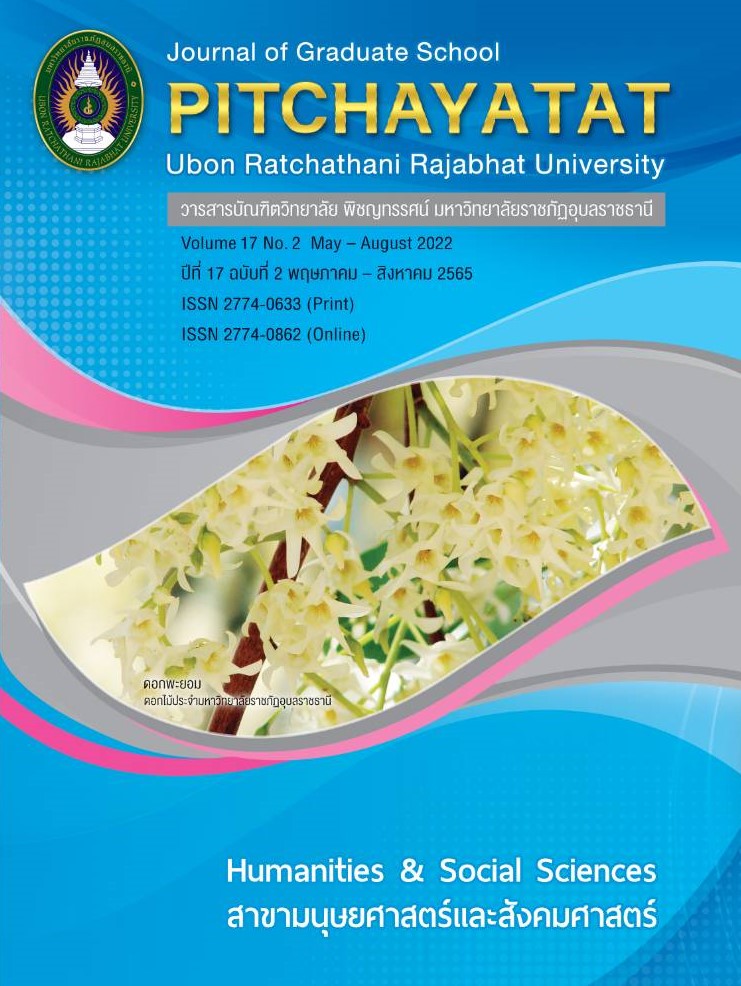การวิเคราะห์การใช้คุณานุประโยคภาษาอังกฤษแบบจำกัดความของนักศึกษาชั้นปีที่ 2 สาขาภาษาอังกฤษธุรกิจ มหาวิทยาลัยราชภัฏอุบลราชธานี
คำสำคัญ:
คุณานุประโยค , คุณนานุประโยคแบบจำกัดความ , ประธานและกรรมของประโยคภาษาอังกฤษบทคัดย่อ
งานวิจัยนี้มีวัตถุประสงค์ 1) เพื่อวิเคราะห์ความสามารถในการใช้คุณานุประโยคแบบจำกัดความที่ขยายคำนามในตำแหน่งประธานและกรรมตรงในประโยคภาษาอังกฤษจำแนกตามลักษณะของคำถามเกี่ยวกับเนื้อหาของคุณานุประโยค และคำถามเกี่ยวกับเนื้อหาของประโยคหลักของนักศึกษาสาขาภาษาอังกฤษธุรกิจ มหาวิทยาลัยราชภัฏอุบลราชธานี และ 2) เปรียบเทียบความแตกต่างของความสามารถในการใช้คุณานุประโยคแบบจำกัดความที่ขยายคำนามในตำแหน่งประธานและกรรมตรงในประโยคภาษาอังกฤษจำแนกตามลักษณะของคำถามเกี่ยวกับเนื้อหาของคุณานุประโยค และคำถามเกี่ยวกับเนื้อหาของประโยคหลักของนักศึกษาสาขาภาษาอังกฤษธุรกิจ มหาวิทยาลัยราชภัฏอุบลราชธานี ตัวอย่างที่ใช้ ได้แก่ นักศึกษาชั้นปีที่ 2 สาขาวิชาภาษาอังกฤษธุรกิจ มหาวิทยาลัยราชภัฏอุบลราชธานี จำนวน 33 คน ได้มาโดยการสุ่มแบบง่าย เครี่องมือที่ใช้ ได้แก่ แบบทดสอบการใช้คุณานุประโยคภาษาอังกฤษแบบจำกัดความที่ขยายคำนามในตำแหน่งประธานและกรรมตรงในประโยคภาษาอังกฤษ สถิติที่ใช้ ได้แก่ ร้อยละและค่าเฉลี่ย
ผลการวิจัยพบว่า
- ผลการวิเคราะห์ความสามารถในการใช้คุณานุประโยคภาษาอังกฤษแบบจำกัดความที่ขยายคำนามในตำแหน่งประธานและกรรมตรงในประโยคภาษาอังกฤษจำแนกตามลักษณะของคำถามเกี่ยวกับเนื้อหาของคุณานุประโยค (ตอนที่ 1)และคำถามเกี่ยวกับเนื้อหาของประโยคหลัก (ตอนที่ 2) พบว่า 63.48% ของตัวอย่างตอบคำถามแบบทดสอบการใช้คุณานุประโยคภาษาอังกฤษแบบจำกัดความที่ขยายคำนามในตำแหน่งประธานและกรรมตรงในประโยคภาษาอังกฤษถูก โดยที่ ตอนที่ 1 นักศึกษาตอบถูกที่ค่าเฉลี่ย 68.03% ในขณะที่ตอนที่ 2 นักศึกษาตอบถูกที่ค่าเฉลี่ย 58.92% ซึ่งแสดงให้เห็นว่าตัวอย่างมีความสามารถตอบคำถามถูกในตอนที่ 1 มากกว่าตอนที่ 2
- ผลการเปรียบเทียบความแตกต่างของความสามารถในการใช้คุณานุประโยคภาษาอังกฤษแบบจำกัดความที่ขยายคำนามในตำแหน่งประธานและกรรมตรงในประโยคภาษาอังกฤษจำแนกตามลักษณะของคำถามเกี่ยวกับเนื้อหาของคุณานุประโยค (ตอนที่ 1) และคำถามเกี่ยวกับเนื้อหาของประโยคหลัก (ตอนที่ 2) พบว่า กลุ่มตัวอย่างมีความเข้าใจมีความแตกต่างในระดับสูงที่สุด คือ ส่วนที่ 2 โดยมีค่าเฉลี่ยของจำนวนนักศึกษาที่ตอบคำถามถูกแตกต่างกันมากที่สุดที่ร้อยละ 30 ส่วนที่ไม่มีความแตกต่างกัน คือ ส่วนที่ 4
เอกสารอ้างอิง
จุฑามณี ทิพราช และคณะ. “การศึกษาคุณานุประโยคภาษาอังกฤษที่ปรากฏในข่าวธุรกิจหนังสือพิมพ์ออนไลน์ ซีเอ็นเอ็น,” วารสารพิชญทรรศน์. 16, 1 (มกราคม-เมษายน 2564): 43-58.
ฐานิยา ทองไทย. ผลกระทบของโครงสร้างข้อมูลคุณานุประโยคภาษาอังกฤษต่อการจำเนื้อหาของนักศึกษา สาขาวิชาภาษาอังกฤษ มหาวิทยาลัยราชภัฏอุบลราชธานี. วิทยานิพนธ์ศิลปศาสตรมหาบัณฑิต มหาวิทยาลัยอุบลราชธานี, 2558.
ศุภกรณ์ ภู่เจริญศิลป์. การศึกษาคุณานุประโยคภาษาอังกฤษในระหว่างผู้เรียนชาวไทยที่เรียนภาษาอังกฤษเป็นภาษาต่างประเทศ. วิทยานิพนธ์ศิลปศาสตรมหาบัณฑิต จุฬาลงกรณ์มหาวิทยาลัย, 2552.
Azar, Betty Schrampfer. Understanding and Using English Grammar, Third
Edition. New York: Pearson Education, 1999.
Brown, H.D. Principle of language teaching and learning, 4th ed. New York:
Pearson Education, 2000.
Corder, S.P. Error analysis and interlanguage two. New York: Oxford University Press,
Halliday, M. A. K. An Introduction to Functional Grammar. London: Edward Arnold, 1985.
Kocak, Arzu. “Turkish tertiary level EFL learners’ recognition of relative clauses,” Journal of Language and Linguistic Studies. 16, 4 (2020): 1637-1655.
Kusdianty, Stevyara Rismawathi. “The Analysis of Students’ Error in Using Relative Clause,” Indonesian EFL Journal. 2, 1 (1 January 2016): 60-70.
Suh, J. “EFL Korean Learners' Use of Relative Clauses in Both Context-Free and Context-Rich Situations,”
Journal of English Teaching. 66, 2 (summer 2011): 189-210.
Suputra, Ajah, Husna, Mariyani and Tria Sandi Ayu, Lestari. “English Department Students Error in the Use of Adjective Clause,” Journal of Physics: Conference Series. (September 2017): 1-4.
ดาวน์โหลด
เผยแพร่แล้ว
รูปแบบการอ้างอิง
ฉบับ
ประเภทบทความ
สัญญาอนุญาต
ลิขสิทธิ์ (c) 2022 วารสารบัณฑิตวิทยาลัย พิชญทรรศน์ มหาวิทยาลัยราชภัฏอุบลราชธานี

อนุญาตภายใต้เงื่อนไข Creative Commons Attribution-NonCommercial-NoDerivatives 4.0 International License.
บทความทุกเรื่องได้รับการตรวจความถูกต้องทางวิชาการโดยผู้ทรงคุณวุฒิภายนอกอย่างน้อย 3 คน ความคิดเห็นในวารสารพิชญทรรศน์เป็นความคิดเห็นของผู้นิพนธ์มิใช่ความคิดเห็นของผู้จัดทำ จึงมิใช่ความรับผิดชอบของวารสารพิชญทรรศน์ และบทความในวารสารพิชญทรรศน์สงวนสิทธิ์ตามกฎหมายไทย การจะนำไปเผยแพร่ต้องได้รับอนุญาตเป็นลายลักษณ์อักษรจากกองบรรณาธิการ





